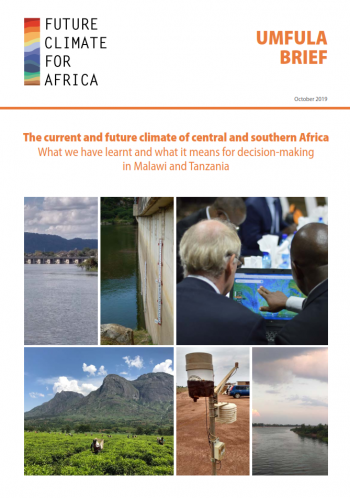 After 4 years of research by a multi-disciplinary team and co-production in partnership with government staff, the UMFULA project has released a briefing note that discusses "The current and future climate of central and southern Africa: What we have learnt and what it means for decision-making in Malawi and Tanzania". It highlights how understanding the likely future characteristics of climate risk is a key component of adaptation and climate-resilient planning, but given future uncertainty it is important to design approaches that are strongly informed by local considerations and are robust to uncertainty. Choosing the right tools and approach for climate risk assessment and adaptation to suit the scale of the decision allows a suitable trade-off between robustness and resources required (time and expertise) for analysis. In the medium term, policy decisions require careful cross-sectoral planning, particularly in cases involving large investments, long life-times and irreversibility, where there is a strong argument for assessing resilience to future climate change (for example around water, energy and food in Malawi and Tanzania). Co-producing knowledge, as in UMFULA, contributes to building societal and institutional capacity to factor climate risks into long-term planning. It also builds the capacity of researchers to better understand real world decision contexts in which climate change is one of many important factors.
After 4 years of research by a multi-disciplinary team and co-production in partnership with government staff, the UMFULA project has released a briefing note that discusses "The current and future climate of central and southern Africa: What we have learnt and what it means for decision-making in Malawi and Tanzania". It highlights how understanding the likely future characteristics of climate risk is a key component of adaptation and climate-resilient planning, but given future uncertainty it is important to design approaches that are strongly informed by local considerations and are robust to uncertainty. Choosing the right tools and approach for climate risk assessment and adaptation to suit the scale of the decision allows a suitable trade-off between robustness and resources required (time and expertise) for analysis. In the medium term, policy decisions require careful cross-sectoral planning, particularly in cases involving large investments, long life-times and irreversibility, where there is a strong argument for assessing resilience to future climate change (for example around water, energy and food in Malawi and Tanzania). Co-producing knowledge, as in UMFULA, contributes to building societal and institutional capacity to factor climate risks into long-term planning. It also builds the capacity of researchers to better understand real world decision contexts in which climate change is one of many important factors.
